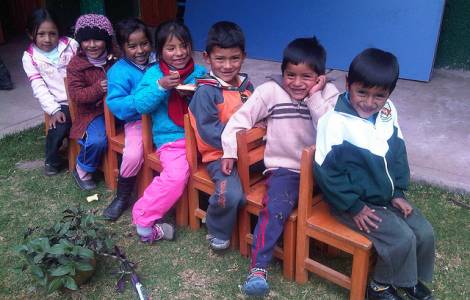
Education International
Puerto Maldonado (Agenzia Fides) – In order to give a future to young people and indigenous peoples in this region, more support is needed in the social sphere, a strong political will, ethical conviction on the value of life, the search of a balance between human activity and respect for its biodiversity": these are some of the solutions proposed by Father Xavier Abex that could help change the situation in Puerto Maldonado, the city that Pope Francis will visit on January 19, 2018 as part of his trip to Peru where he will meet the indigenous peoples in the regions of Madre de Dios, Ucayali and Cusco. The Pope will also visit "El Principito" hostel, founded by Father Abex in 1996.
Father Xavier Abex, born in Switzerland 75 years ago, is the founder of the Association for the Protection of Children and Adolescents (Asociación de Protección del Niño y Adolescente, APRONIA), which runs two homes for 50 children and adolescents in difficulty, in addition to being the pastor of San Vicente parish. In a conversation with Agenzia Fides he describes the situation in Puerto Maldonado. The minors hosted in the two reception centers of the Association come from orphanages, situations of abandonment or danger to their physical or moral integrity due to domestic violence or harassment of all kinds. "We try to guarantee higher education for some of them - says Father Xavier -. Everyone goes to school institutes in the city. We try to make their life similar to that of a family with so many children".
Recalling the first moments, upon his arrival in Peru, Fr. Xavier tells Fides: "I imagined it to be a poor country, but not so disorganized and violent. In the Upper Plane, in Macusani, in Puno I found it hard to get used to the cold weather or to the Quetchua world because I did not know their customs and their language well. Even the mining area of Mazuko-Huaypethue was a difficult area. There was no public service of any kind, not even roads, means of communications were very difficult". Madre de Dios is one of the most violent areas of the country, with serious problems such as mining, it is the second region with the highest rate of homicides in the country, where domestic violence, psychological, physical and sexual violence against minors unfortunately is frequent.
"In addition to this, the life cycle of water is being destroyed for uncontrolled mining activities - continues Fr. Xavier - that is why the local Catholic Church, through its Commission for Social Pastoral and Human Rights, feels the prophetic duty to launch a great cry of alarm". According to the priest, the situation could change through "greater support in the social sphere, a strong political will and an ethical conviction on the value of life of the population, the implementation of the Zonificación Ecológica Económica". This latter process serves to identify the various alternatives for a sustainable use of the territory, based on the assessment of its physical, biological, social, economic and cultural potential and limitations. "We need to work to reach a balance between human activity and respect for biodiversity", stresses Xavier, who in his forty years of work in the region has not lost the hope that the situation will improve, a hope that feeds on a profound spiritual experience and proximity to the people and communities in which he carries out his pastoral work. (LG-SL) (Agenzia Fides, 21/11/2017)